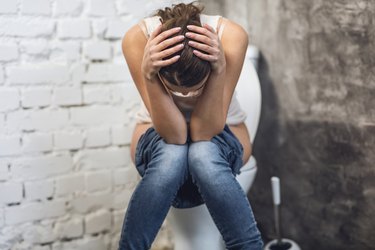
If you've recently changed your diet to include new foods, you may be spending more time in the bathroom. You could actually get stomach pain when eating healthy because the change in diet can cause gas and diarrhea. It's usually nothing to worry about. It may just take time for your body to adjust.
Any change in diet could cause gas and diarrhea or other stomach issues because your gut flora, or microbiome, has to react to new foods.
Video of the Day
Video of the Day
"It does take time for your gut to adjust to a new diet," says Elena Ivanina, DO, a gastroenterologist at Lenox Hill Hospital in New York City. "This is partly because a new diet changes your microbiome. In fact, your microbiome can change in as little as three days. Generally, people feel they get used to a new diet in a few weeks."
Your microbiome consists of trillions of microorganisms that live in your gut, including bacteria, fungi, parasites and viruses, according to Harvard T.H. Chan School of Public Health.
Read more: Tummy Troubles: Finding the Cause
What Causes Gas and Diarrhea?
Gas in the gut is either swallowed or produced by the bacteria of the microbiome when it breaks down undigested food, according to Cedars Sinai.
"As for diarrhea, there are many different causes," Dr. Ivanina says. Diarrhea after starting a diet is usually not concerning, she says, but, when not due to a change in diet, diarrhea, in general, may be due to other factors such as infection, new medication or a functional condition.
Food intolerance is a major culprit of gas and diarrhea, according to the Mayo Clinic. (You may even experience gas that causes back pain or severe stomach pain.) This occurs if your digestive system is unable to break down and absorb foods, such as the lactose sugar in dairy products, or proteins like gluten found in wheat and other grains.
Carbohydrates can cause gas and are often the trigger, while fats and proteins don't typically cause a lot of gas, according to Cedars Sinai. There is actually an acronym for carbohydrates and sugars that are poorly digested: FODMAP (fermentable oligosaccharides, disaccharides, monosaccharides and polyols). Even though many of the foods in this group are fibrous and whole foods, they can give your stomach a workout.
"Changes in diet to include healthy foods that happen to be high in FODMAPs can increase gas and/or diarrhea," Dr. Ivanina says. "For example, adding more garlic, onions, broccoli, cauliflower and apples may significantly increase gas and/or diarrhea, even though they are considered healthy."
FODMAPs occur naturally in certain foods. "The most common foods that have been found to cause gas and diarrhea are the high-FODMAP foods, which include things like dairy and wheat," Dr. Ivanina says.
Read more: How the Low-FODMAP Diet Works and How to Get Started
The Worst Foods for Diarrhea and Gas
High-FODMAP foods that may cause gas and diarrhea fit into the following categories, per Cedars Sinai:
- Soluble fiber, or fiber that dissolves or becomes liquid in water, which is found in foods such as oat bran, beans and the majority of fruits.
- Insoluble fiber, or fiber that does not dissolve in water, which includes wheat bran and some vegetables.
- Fructose, a sugar found in foods such as pears and onions. It can also be added to drinks like sodas to make them sweeter.
- Lactose, a natural sugar found in milk and dairy products.
- Raffinose, found in foods such as beans, cabbage, broccoli and whole grains.
- Sorbitol, a sugar in fruits, such as apples, pears and peaches, and used as a sugar substitute in certain sugar-free foods.
- Starches, such as potatoes and wheat (rice is an exception — it's a starch that won't make you gassy).
"Artificial sweeteners are also famous for causing gas and diarrhea, as they are not absorbed in the gut," Dr. Ivanina says.
The National Institute of Diabetes and Digestive and Kidney Diseases also recommends limiting the following to reduce gas:
- Carbonated drinks
- Fried and fatty foods
- High-fiber foods (temporarily limit these foods and then gradually add them back in as your body gets used to more fiber)
- Sugar (found in fruit juice, soda, candy and packaged treats)
In addition to the FODMAP culprits above, NIDDK also suggests avoiding these when you have diarrhea:
- Alcohol
- Caffeine
- Spicy foods
And, if your symptoms don't resolve with time and your body isn't adjusting to your new diet, it's best to go see your doctor.
Read more: The 10 Best Natural Remedies for Diarrhea
- Elena Ivanina, DO, gastroenterologist, Lenox Hill Hospital, New York, New York
- Mayo Clinic: “Gas and Gas Pains”
- Cedars Sinai: “Gas in the Digestive Tract”
- Harvard T.H. Chan School of Public Health: The Nutrition Source: “The Microbiome”
- National Institute of Diabetes and Digestive and Kidney Diseases: “Eating, Diet, & Nutrition for Diarrhea: What Should I Eat If I Have Diarrhea?”
- National Institute of Diabetes and Digestive and Kidney Diseases: “Eating, Diet, & Nutrition for Gas in the Digestive Tract: What Should I Avoid Eating to Reduce Gas?”
Is this an emergency? If you are experiencing serious medical symptoms, please see the National Library of Medicine’s list of signs you need emergency medical attention or call 911.